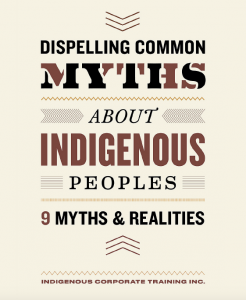Dispelling Common Myths About Indigenous Peoples: 9 Myths & Realities (ebook)

I find the Indigenous Corporate Training Inc. (www.ictinc.ca) website is a good website for broad, brief knowledge on a lot of topics. This ebook is free and it caught my attention since we are discussing stereotypes in Week 4.
The first myth is “Indigenous peoples are all the same”.
I think this is worthy of being #1. I remember reading the popular non-fiction author Michael Pollan’s book This Is Your Mind on Plants and he frequently referred to “Indigenous people” in a general way. I mentally bumped on it every time, and wanted to tell him and his editor that the “s” in “Indigenous peoples” is crucially important. But honestly it’s easy for those of us not familiar with one or more Indigenous nations or groups (such as myself) to fall into thinking that there is an Indigenous way of thinking/doing/being, rather than many, many ways. I know intellectually that there are many First Nations, and other groups like the Inuit and the Metis, but that knowledge isn’t very salient to me because I don’t know any Indigenous people or peoples. I certainly have found myself falling into this trap when thinking about my final research project for this course. I want to look at ‘collectivist’ cultures, but which Indigenous cultures would make the most sense to research and how much information will I be able to find? I’m not yet sure.
However, I am sure that I want to decolonize my thinking and not group all Indigenous peoples together! There are times when I think it’s okay to generalize and talk about, for example, a Western worldview, but we need to be very careful.
The ninth myth in this ebook is “Missing and murdered Indigenous women brought it upon themselves”.
This one makes me sad, and furious, and triggered (for lack of a better term). I want to think that no one could believe this, but I know from experience that people do blame victims of sexual violence.
The other 7 myths are, sadly, the ones you would probably guess. Overall this ebook is a good quick primer about all the negative stereotypes that Indigenous people in Canada face on a regular basis. The content is straightforward and a bit more practical than the Prins piece, which is more about how somewhat positive stereotypes (like the romantic exoticism of the vanishing Indian) can still be harmful.
Hi Ananda,
Thank you so much for reminding us about that final plural ‘s’ on Peoples.
I won’t forget again!
Best,
Kirsten